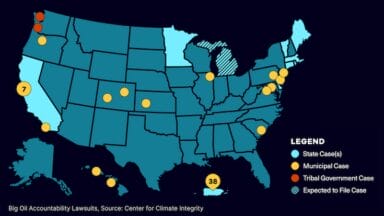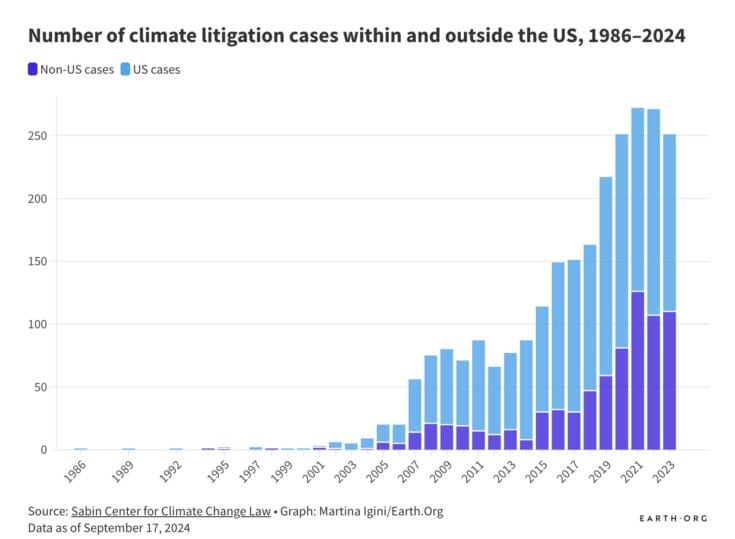Sign up for Power & Progress.
In Power & Progress, we analyze how elected leaders are impacting global climate action, and the economic and societal power dynamics at play. How does power impede and propel progress? How do movements for progress build and use power? Vea la versión en español de “Poder y Progreso.”
Taking Big Oil to Court
A growing number of communities across the US are suing fossil fuel companies for climate damages caused by their products. Their core argument? Oil companies knew fossil fuels were driving climate change and lied about it.
Dozens of city, county, and tribal governments, and 11 state attorneys general, have filed lawsuits over the past decade — a surge of litigation that nevertheless has remained a low media priority, especially at the local level. “These cases collectively represent more than 1 in 4 people living in the United States,” reports the Center for Climate Integrity.
These “polluter pays” cases seek compensation from the corporations based on their alleged contribution to harmful climate change impacts. They mirror legal attacks on the tobacco industry in the 1990s, which resulted in settlements of billions of dollars. The majority of these types of cases are being brought in the US, but the case furthest along globally is one brought by a Peruvian farmer against the German energy company RWE, which could be decided by the end of May. The farmer argues that RWE’s emissions contributed to the global warming that sped up the melting of a nearby glacier. He wants the company to contribute funds to mitigation efforts to protect his farm and his town (population 50,000) from a possible future catastrophic flood.
“While this is just one case focused on this one place in Peru, the wider implications are huge,” Murray Worthy, from Zero Carbon Analytics, a research group on climate change, told the AP. “The costs and damages from climate change could run to tens of trillions of dollars a year, and if fossil fuel companies at large are found to be responsible for those and need to pay those costs, it would completely change the finances and outlook for the entire fossil fuel industry.”
Hoping to avoid trial, “fossil fuel interests are deploying unprecedented strategies to hide evidence of companies’ deception and block liability lawsuits,” reports Emily Sanders at DeSmog. In one case in Oregon, where Multnomah County “is seeking more than $51 billion to pay for damages” from the 2021 heat dome that resulted in the deaths of 72 people, Politico’s Corbin Hiar reported that a “GOP-linked” opposition research firm is gathering info “that could be used to discredit officials” involved in the case.
Last May, 19 Republican attorneys general petitioned the US Supreme Court “to block several Democratic-led states from pursuing climate change lawsuits against the oil and gas industry in their own state courts,” reports David Lieb at the Associated Press. The Supreme Court rejected that lawsuit in March.
And just last Wednesday, “in a move that legal experts say is highly unusual, Trump’s Department of Justice filed lawsuits […] against Hawai‘i and Michigan over those states’ anticipated climate suits against oil companies,” reports Dana Drugmand at InsideClimate News. Hawai‘i Attorney General Anne Lopez filed a lawsuit against seven oil and gas companies as well as the American Petroleum Institute the next day. Friday, Puerto Rico dropped its lawsuit against Big Oil, reports Dharna Noor at The Guardian.
Oil-and-gas interests are also lobbying the president and members of Congress to “consider granting legal protection for oil companies against lawsuits over their contributions to climate change,” reports the Wall Street Journal. “The fossil-fuel industry has learned from the mammoth lawsuits that clobbered tobacco companies and wants to avoid the same fate.”
So far, immunity legislation has not been introduced and although these cases take years to move through the courts, many are moving forward. In a major decision in January, the Supreme Court unanimously declined to reconsider a 2023 Hawai‘i Supreme Court decision allowing Honolulu’s case against Sunoco LP to go forward. That case, filed in 2020, is poised to enter the discovery phase and could be one of the first to go to trial.
Story Ideas
- Write about the lawsuits in your state or region. Sources:
- The Center for Climate Integrity offers a database of US accountability lawsuits with information and status updates for each case.
- The Sabin Center for Climate Change Law’s Climate Change Litigation Database, which is searchable and includes US and global cases.
- The Grantham Research Institute on Climate Change and the Environment at the London School of Economics offers an annual report on global trends in climate change litigation.
- Report on consumer protection laws. “Every state has a consumer protection law that prohibits deceptive practices,” reports the National Consumer Law Center in its most recent report, “but their effectiveness varies widely from state to state.”
- Explore Big Oil’s campaign of denial and disinformation. A 2024 bicameral congressional investigation unveiled “new documents exposing the fossil fuel industry’s role in spreading climate disinformation and preventing action on climate change.”
- Report on immunity laws. Two decades ago, Congress gave gun manufacturers “near-blanket immunity” when it passed and then-president George Bush signed the federal Protection of Lawful Commerce in Arms Act (PLCAA). Will Congress do the same for fossil fuel companies?
- Public opinion. Nearly three quarters of American voters support the climate lawsuits, according to a new Data For Progress poll. Ask people in your community whether they think fossil fuel companies should pay for deceiving the public about their products and climate change.
Stories We Like
- “‘New territory’ for courts” by Mona Harfmann in ORF Topos
- “Big Oil Rallies to Obstruct Accountability” by Emily Sanders in DeSmog
- “Who should pay billions for climate disasters? California and others target Big Oil — will that work?” by Alejandro Lazo at CalMatters
Support Covering Climate Now
We’re working to help journalists worldwide improve and expand their climate coverage. Meet our staff and learn more about CCNow.


